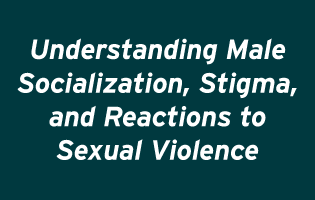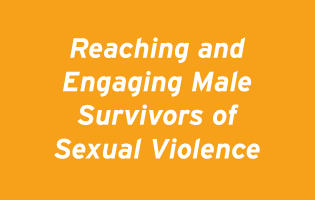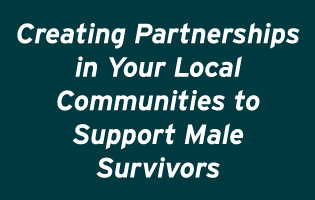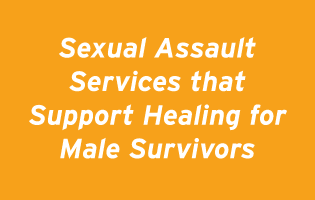
Your sexual assault center will best serve the community when it has strong partnerships. Strong partnerships can lead to cross-training, where two or more organizations train each other on each of your areas of expertise. This can help ensure that everyone’s service delivery and community engagement is relevant to the people you’re trying to reach. For example, to work effectively with male survivors who are or were in the military, it can help to learn military jargon and acronyms. Having a strong partnership with military groups in your community can help you be ready to do this.
Strong partnerships can also lead to good referrals, which is an important part of serving male survivors. For all of the reasons explored in our sections on male socialization and reaching and engaging men, we already know that men may not identify sexual assault centers as a place to go for healing from trauma. So when men do seek help, it may be for an experience related to sexual trauma (like addiction, housing, or therapy). Having good relationships with the people providing these other services in your community can help them recognize sexual trauma and make a connection with your sexual assault center.
Establishing and growing relationships with partner organizations isn’t just about reaching male survivors, of course. These relationships will benefit your entire program and the people you serve and seek to serve.
Consider the following settings when evaluating your existing partnerships and identifying who you still need to know: drug and alcohol programs, mental health services, schools and universities, faith communities, criminal justice systems, military settings and veteran’s affairs, sports teams, cultural groups, HIV clinics, and LGBTQ services. In developing these partnerships, consider whether it would be possible to set up satellite offices to help reach male survivors where they’re already going for other services and resources.
Assessing Our Capacity for Serving Male Survivors of Sexual Violence – Assessment tool
Sexual assault advocates and rape crisis centers can use this self-assessment tool to reflect on your current work serving men who have had unwanted sexual experiences. The tool offers reflection questions related to individual and organizational capacity to serve male survivors.
Lessons on Serving Male Survivors Through Sexual Assault Services Program – Print publication
A resource containing lessons learned from sexual assault services programs with comparatively high percentages of male survivors served with that funding stream. An accompanying blog series highlights in more depth what programs told us about their work: see blog one, blog two, and blog three.
Working with Male Survivors: Accessing Support After Incarceration – Podcast
Tonjie Reese, Senior Program Officer at Just Detention International, talks about working with male survivors who are formerly incarcerated. JDI supports survivors who are incarcerated and advocates who work with survivors who are incarcerated, and there are lots of opportunities for advocates to support survivors as they reenter the community.
Working with Male Survivors: Economic Barriers Behind Bars – Podcast
Tonjie Reese, Senior Program Officer at Just Detention International, talks about working with male survivors who are incarcerated. Tonjie highlights economic barriers and racial justice issues, and shares tips for advocates on hotline services, reaching survivors through inmate education efforts, and more.
Working with Male Survivors: Healing at Sexual Assault Centers and Beyond – Podcast
Sharon Imperato, Project Director of Clinical Training and Technical Assistance at the Boston Area Rape Crisis Center, and Jim Struve, executive director of MenHealing, talk about working with male survivors of sexual assault. They share their history of collaboration, approaches to working with male survivors, and sexual assault center services that support men in healing from sexual trauma.
Working with Male Survivors: How Sexual Assault Impacts Transgender Men – Part 2 – Podcast
michael munson, executive director of FORGE, talks about working with transgender men and transmasculine survivors. In this second part of a two-part conversation, michael talks about sexual assault services advocates can provide when working with trans men and transmasculine survivors.
Working with Male Survivors: Talking to Men with Disabilities About Sexual Assault – Podcast
Leigh Ann Davis, director of criminal justice initiatives at The Arc of the United States, and James Meadours, is a board member on Texas Advocates and a national advocate for healing from sexual assault and the rights of people with intellectual disabilities, talk about working with male survivors of sexual assault who have disabilities.
Returning and Healing Toolkit – Report
This 2020 toolkit from the National Resource Center includes recommendations for sexual assault centers working with survivors coming home from incarceration, and curriculum on sexual trauma in the returning population and talking about sexual violence. The toolkit also includes tip sheets for reentry agencies, which sexual assault advocates could use in building partnerships.
For more information please email resources@nsvrc.org
 |
 |
 |
 |
 |
 |
 |
 |
